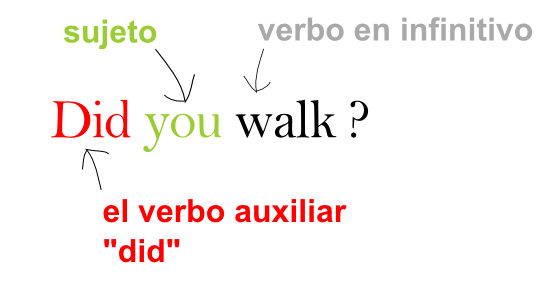El pasado simple se utiliza para hablar de acciones concretas que comienzan y terminan en el pasado. Generalmente, lo usamos con adverbios de tiempo como "last year", "yesterday", "last night"...
Para expresar pasado con el verbo TO BE se deben tener en cuenta las formas del pasado WAS y WERE, conjugados de la siguiente forma según la persona:

I was
You were
He was
She was
It was
We were
They were
Y tener en cuenta las siguientes estructuras para expresarse de forma afirmativa, interrogativa y negativa:
SIMPLE PAST WITH VERB TO BE
|
||
AFFIRMATIVE FORM
S + (WAS/WERE) + C
|
INTERROGATIVEFORM
(WAS/WERE) + S + C ?
|
NEGATIVE FORM
S + (WAS/WERE) + NOT + C
|
She was a doctor.
The keys were in the box.
|
Was she a doctor?
Were the keys in the box?
|
She wasn't a doctor.
The keys weren't in the box.
|
Para los demás verbos que no son TO BE (ser/ estar), se debe tener en cuenta si son verbos regulares o irregulares.
Los verbos regulares son aquellos cuyo pasado o participio se forma añadiéndoles la terminación "-ed". La forma es la misma para todas las personas (I, you, he, she, it,
we, they).
Ejemplos:
learn (aprender) → learned
stay (quedarse/permanecer) → stayed
walk (caminar) → walked
show (mostrar) → showed
Excepciones:
Para
verbos que terminan en una "e",
sólo añadimos "-d.
Ejemplos:
change → changed
believe → believed
Si
el verbo termina
Ejemplos:
stop → stopped
commit → committed
Con
verbos que terminan en una consonante y una "y", se cambia la "y"
por una "i".
Ejemplos:
study → studied Cry --> cried
try → tried
Los verbos irregulares son aquellos cuyo pasado o participio pasado no sigue ninguna regla y se debe aprender o memorizar.
Nota:
Hay muchos verbos irregulares en inglés. Desafortunadamente, no hay una norma
establecida para formarlos. A continuación tienes los tres verbos irregulares
más comunes y los que actúan como verbos auxiliares.
Verb
|
Past Simple
|
be
|
was (I, he,
she, it) / were (you, we, they)
|
do
|
did
|
have
|
had
|
Ejemplos:
begin (comenzar) → began
bite (morder) → bit
break (romper) → broke
construir (construir) → built
buy (comprar) → bought
En la forma negativa e interrogativa se hace necesario el uso de auxiliar DID con la forma simple del verbo.


Las siguiente son las estructuras para expresarse de forma afirmativa, interrogativa y negativa:
SIMPLE PAST WITH AUXILIARY DID
|
||
AFFIRMATIVE FORM
S + V(past) + C
|
INTERROGATIVE FORM
DID + S + V + C ?
|
NEGATIVE FORM
S + DID NOT + V + C
|
You wanted to dance.
He learnt English.
They believed him.
She bought a car
|
Did you want to dance?
Did he learn English?
Did they believe him?
Did she buy a car?
|
I didn't want to dance.
He didn't learn English.
They didn't believe him.
She didn't buy a car
|


EXERCISE:
Order the
sentences:
1.
cooked/last
/Sarah/spaghetti /Monday ……………………………………………………....
2. night/ John/last/English/studied ……………………………………………………....
3. walk/James/in/night/park/did/the/last/? ……………………………………………………....
4. car/very Saturdays/washed/I/my ……………………………………………………....
5. listened/yesterday/Susi/to/music ……………………………………………………....
6. room/not/Alex/ yesterday/his/clean/did ……………………………………………………....
7.
two/mountain/we/a/climbed/ago/high/weeks ……………………………………………………....
Rewrite the
sentences into NEGATIVE form.
1.
They cleaned the
windows last week. ……………………………………………………....
2.
Alexander Graham
Bell invented the telephone. ……………………………………………………
3.
She worked on
her project last Saturday. ………………………………………………………
4.
I opened my
bedroom door. ………………………………………………………
5.
Before money
people exchanged food. ………………………………………………………
Change the
sentences into QUESTIONS.
1.
They studied
Maths with a teacher. ………………………………………………………
2.
Laura and John
protected the animals. ………………………………………………………
3.
People recycled
plastic and paper. ………………………………………………………
4.
The children
played in the garden last Saturday…………………………………………………
5. My family walked in the
park yesterday. ………………………………………………………




No comments:
Post a Comment